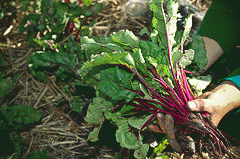Scenes from an Urban Garden
Last summer, Kalamazoo College senior Nick Leonard discovered a new way of life by way of his senior project. The pre-law English major was concerned about environmental issues, but he wrestled with ways he could approach this complex and multi-faceted subject in an authentic and compelling way that was meaningful to him.
Thanks to his girlfriend, who is a gardener and an activist in the local food movement, Nick decided to seek a two-and-a-half-month internship with the Detroit urban garden program.
He worked 40- to 45-hours a
week from Tuesday through Saturday tending various community gardens,
selling homegrown vegetables at the Eastern Market, and working on
projects like the annual Detroit Agricultural Network's August tours.
"I
enjoy getting my hands dirty and I like the outdoors," said Nick, who
spent previous summers earning good money on landscaping jobs.
"Physical labor is especially gratifying in farming, though, because someone benefits from your work by eating the food you've produced. It makes the long hours of weeding, hauling, shoveling compost, watering plants, and hoping for rain worth it because you can see the results."
Nick also helped out at the Earthworks greenhouse, a 1,300-square-foot facility that produces more than 100,000 vegetable seedlings for family, community, and school gardens across the city at no cost. The organization's gardens also supply fresh, organic produce for the Capuchin Soup Kitchen, the Gleaners Community Food Bank on Detroit's Eastside and various neighborhood outlets.
Because there are no major grocery chains in Detroit and transportation is a problem, many poor people buy their food at gas stations and corner stores. It's no wonder that kids consider Coke and chips a meal! The urban gardens, however, provide people with an alternative to this "food desert," and they also bring neighborhood residents, young and old, together as a neighborhood community to produce the fruits and vegetables they can eat.
These hardcore facts about urban living taught Nick the connection between poverty and the environment. He also discovered that sustainability issues-as well as people's sense of self-sufficiency-can be addressed through the growing of food.
"I began to realize the human stake in environmental issues," said Nick, "especially as I read about instances of environmental racism in low-income communities across the country. Such racism was in play in Detroit, a � ��˜food dessert', which is best described as an area in which fresh produce is not easily available."
Although Nick is interested in environmental issues, he doesn't readily identify with environmentalists, whom he considered "tree huggers" and "hippies." However, the urban gardeners he met in Detroit taught him differently.
"These people work 50 hours a week and they not only care about the environment and sustainability, they do this work to help others," he said. For example, Nick's mentor, Kido (pronounced KE-doh) Pielack, 28, is an Americorps volunteer who works for Greening of Detroit, one of several nonprofit organizations involved in coordinating the city's gardens.
Kido supervised Nick every day for the first few weeks until he gradually left him on his own. While they worked, they found lots of time to talk, and often, after a long day, they shared a beer at a neighborhood tavern.
"He taught me everything I know about urban farming and much of my senior project wouldn't have been completed without his guidance."
Megan Kohn, 25, a Central Michigan University graduate and an urban agriculture apprentice for Greening of Detroit, was another person Nick met. Her charge was the Romanowski Park garden, a huge expanse of land on the city's southwestern side in "Mexicantown" where Hispanics, Arabs, and Muslims live. The park includes 20 raised beds of vegetables, a fruit orchard and compost pile, as well as soccer fields, basketball courts, and an elementary school. Megan also hosts a garden club for neighborhood kids and on occasion Nick helped her with it.
"It was an interesting adventure working with the kids," said Nick, who felt particularly challenged because "they were pretty rambunctious." Working the gardens, however, gave Nick and Megan an opportunity to talk in a calmer, more peaceful setting. They discussed the joys and difficulties of gardening, the politics of local food, the spiritual and philosophical principles of nature and the environment, and ways they could spread the word about homegrown produce to neighborhood residents.
These and the other young leaders he met were well-educated, dedicated to their work and sincere about living environmentally-friendly lifestyles. Quite often they lived in the same neighborhoods as the people they served. And they never treated Nick as "just an intern," he said. Instead, they entrusted him with responsibility as they did any member on staff. They were also interested in his senior project and made sure to give him work that was relevant to his research.
(Note: You can view every article as one long page if you sign up as an Advocate Member, or higher).






